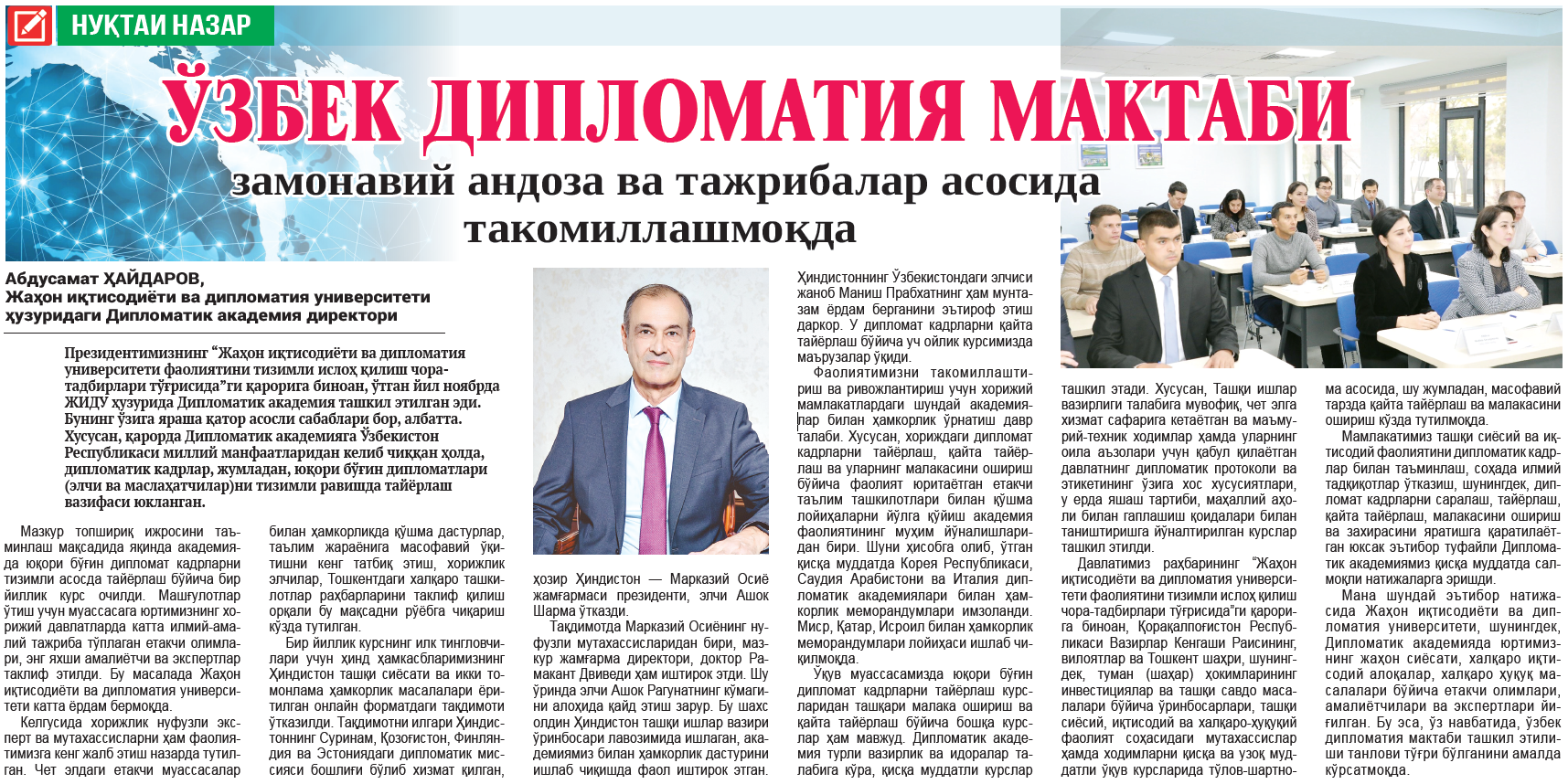
Abdusamat HAYDAROV,
University of world economy and diplomacy
director of the Diplomatic Academy under
According to the decision of our president “on measures to systematically reform the activities of the University of world economy and diplomacy”, a Diplomatic Academy was established in November last year under UWED. There are a number of well-founded reasons for this, of course. In particular, the resolution charged the Diplomatic Academy with the task of systematically training diplomatic personnel, including diplomats from the upper echelons (ambassadors and advisers), based on the national interests of the Republic of Uzbekistan
In order to ensure the execution of this task, a one-year course on the systematic training of high-level diplomatic personnel was recently opened at the Academy. Leading scientists, best practitioners and experts from our country, who have accumulated great scientific and practical experience in foreign countries, were invited to the institution for training. The University of world economy and diplomacy is of great help in this matter.
In the future, it is envisaged to widely involve foreign authoritative experts and specialists in our activities. Joint programs in cooperation with leading institutions abroad, the wide application of distance learning to the educational process, the invitation of foreign ambassadors, heads of international organizations in Tashkent, are aimed at realizing this goal.
For the first listeners of the one-year course, a presentation of our Indian colleagues in an online format was held, covering issues of Indian foreign policy and bilateral cooperation. The presentation was held by Ambassador Ashok Sharma, now president of the India — Central Asia Foundation, who previously served as head of India's diplomatic mission to Suriname, Kazakhstan, Finland and Estonia.
Dr. Ramakant Dvivedi, one of the prestigious specialists of Central Asia, director of this fund, also took part in the presentation. At this point, it is necessary to separately note the support of Ambassador Ashok Ragunat. This person previously served as the Deputy Minister of foreign affairs of India, actively participated in the development of a cooperation program with our academy. Mr. Manish Prabhat, the Indian Ambassador to Uzbekistan, is also a regular contributor to darkor. He gave lectures in our three-month course on retraining of diplomat personnel.
The requirement of the period to establish cooperation with such academies in foreign countries for the improvement and development of our activities. In particular, the establishment of joint projects with leading educational organizations engaged in the training, retraining and professional development of diplomat personnel abroad is one of the important directions of the Academy's activities. In view of this, in the past short term, memorandum of cooperation was signed with the diplomatic academies of the Republic of Korea, Saudi Arabia and Italy. A draft memorandum of cooperation is being developed with Egypt, Qatar, Israel.
In addition to the courses of training of senior diplomatic personnel, our educational institution also offers other courses on training and retraining of skills. The Diplomatic Academy provides short-term courses at the request of various ministries and departments. In particular, in accordance with the request of the Ministry of Foreign Affairs, courses were organized aimed at introducing the peculiarities of the diplomatic protocol and etiquette of the receiving state for administrative and technical personnel and their family members, the procedure for living there, the rules for talking to local residents.
According to the decision of the head of our state “on measures to systematically reform the activities of the University of world economy and diplomacy”, the chairman of the Council of Ministers of the Republic of Karakalpakstan, deputy governors of Regions and Tashkent City, as well as district (city) governors for investment and foreign trade issues, specialists in the field of foreign political, economic and international, it is envisaged to retrain and improve skills in a distance manner.
Due to the high attention paid to the provision of diplomatic personnel for foreign political and economic activities of our country, scientific research in the field, as well as the selection, training, retraining, training and reserve of diplomatic personnel, our Diplomatic Academy has achieved significant results in the short term.
As a result of such attention, the University of world economy and diplomacy, as well as the Diplomatic Academy, gathered leading scientists, practitioners and experts of our country on World Policy, international economic relations, international law issues. This, in turn, suggests in practice that the choice to establish an Uzbek School of diplomacy was correct.